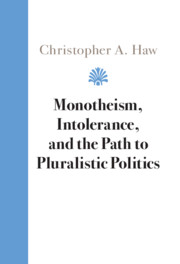4 results
19 - Agonistic Democracy and the Question of Education
- from Part Three - Key Topics and Concepts
-
-
- Book:
- The Cambridge Handbook of Democratic Education
- Published online:
- 20 April 2023
- Print publication:
- 27 April 2023, pp 311-327
-
- Chapter
- Export citation
6 - Publicity and Correcting Democracy
-
- Book:
- Democratic Respect
- Published online:
- 16 March 2023
- Print publication:
- 23 March 2023, pp 189-214
-
- Chapter
- Export citation

Monotheism, Intolerance, and the Path to Pluralistic Politics
-
- Published online:
- 04 June 2021
- Print publication:
- 17 June 2021
Introduction
-
- Book:
- Arendt on the Political
- Published online:
- 15 October 2019
- Print publication:
- 24 October 2019, pp 1-8
-
- Chapter
- Export citation

